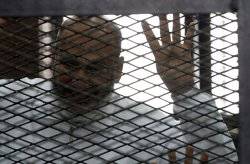An Egyptian court has sentenced 529 members of the outlawed Muslim Brotherhood to death on charges including murder, in a sharp escalation of a crackdown on the movement.
Family members stood outside the courthouse screaming after the verdict - the biggest mass death sentence handed out in Egypt's modern history, defense lawyers said.
Turmoil has deepened since the army overthrew Egypt's first freely elected president, Mohamed Morsi of the Muslim Brotherhood, in July.
Human rights groups said Monday's verdict suggested the authorities intended to tighten their squeeze on the opposition, according to the Reuters news agency.
State television reported the sentences without comment.
A government spokesman and other government officials did not immediately respond to calls.
Most of the defendants at Monday's hearing were detained and charged with carrying out attacks during clashes which erupted in the southern province of Minya after the forced dispersal of two Muslim Brotherhood protest camps in Cairo on August 14.
"The court has decided to sentence to death 529 defendants, and 16 were acquitted," defense lawyer Ahmed al-Sharif told Reuters.
The men can appeal against the ruling.
The Muslim Brotherhood, now largely driven underground, responded by calling for the "downfall of military rule" on its official website.
Mohamed Mahsoub, who served as minister of legal affairs under Morsi, described the court's decision "a ruling calling for the execution of justice" on his Facebook page.
Supporters set fire to a nearby school in protest, state television reported, though security officials said they had received no reports of unrest.
The charges against the group, on trial in Minya since Saturday, include violence, inciting murder, storming a police station, attacking persons and damaging public and private property.
'Quickest case'
"This is the quickest case and the number sentenced to death is the largest in the history of the judiciary," said lawyer Nabil Abdel Salam, who defends some Brotherhood leaders, including Morsi.
"A second year student in the faculty of law would never issue this verdict," said Mohamed Zaree, program manager, Cairo Institute for Human Rights Studies.
"There are a lot of flaws in this verdict. I think maybe an appeal could be successful but nothing is predictable."
HA Hellyer, an Egypt expert and fellow at US think-tank the Brookings Institution, said he doubted the sentences would be carried out.
"Nevertheless, the very issuing of the sentence itself is quite significant," he said.
On Tuesday, the Muslim Brotherhood's Supreme Guide, Mohamed Badie, and 682 others will face trial on charges of incitement to kill.
Only 123 of the defendants were in court on Monday. The rest were either released, out on bail or on the run.
"When the trial starts on Saturday and it is just a procedural hearing, and the judge doesn't listen to any lawyers or witnesses and doesn't even call the defendants, you are before a group of thugs and not the judiciary," Walid, a relative of one of the defendants, told Reuters by phone.
PHOTO CAPTION
Egyptian member of the Muslim Brotherhood Safwat Hegazy flashes the four-finger sign, referring to the sit-in dispersed by security forces in August, during his trial in Cairo, Egypt, 23 March 2014.
Aljazeera


 Home
Home Discover Islam
Discover Islam Quran Recitations
Quran Recitations Lectures
Lectures
 Fatwa
Fatwa Articles
Articles Fiqh
Fiqh E-Books
E-Books Boys & Girls
Boys & Girls  Hajj Rulings
Hajj Rulings Hajj Fatwas
Hajj Fatwas














